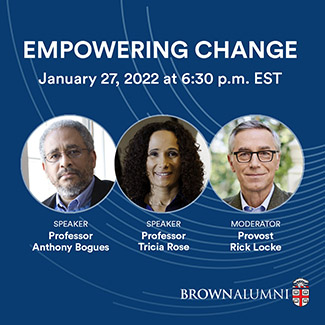 On January 27, 2022 hundreds of Brunonians came together virtually for Empowering Change (see full recording below), which connected the work of two of Brown’s preeminent research centers with the historic events and issues our society is dealing with today. In a discussion moderated by Provost Locke, professors B. Anthony Bogues ADE'02 hon. and Tricia Rose AM'87 PhD'93, P'14 delved into the work of the Center for the Study of Race and Ethnicity in America (CSREA) and the Center for the Study of Slavery and Justice (CSSJ)—and explored how they are helping to shift our societal narratives in the areas of anti-racism, racial equality, and social justice.
On January 27, 2022 hundreds of Brunonians came together virtually for Empowering Change (see full recording below), which connected the work of two of Brown’s preeminent research centers with the historic events and issues our society is dealing with today. In a discussion moderated by Provost Locke, professors B. Anthony Bogues ADE'02 hon. and Tricia Rose AM'87 PhD'93, P'14 delved into the work of the Center for the Study of Race and Ethnicity in America (CSREA) and the Center for the Study of Slavery and Justice (CSSJ)—and explored how they are helping to shift our societal narratives in the areas of anti-racism, racial equality, and social justice.
“Both our scholarly research as well as our public humanities work is really about finding ways—creating platforms—of critical interventions into the historical narratives which undergird our imaginers of our history and who we are as Americans,” said Bogues of the CSSJ. “What we hope to do by puncturing these historical narratives is to make a difference.”
Professor Rose later commented: “It’s almost impossible for me to imagine a peaceful, just, multiracial democracy without an educated, open, critically engaged populace on the question of race.”